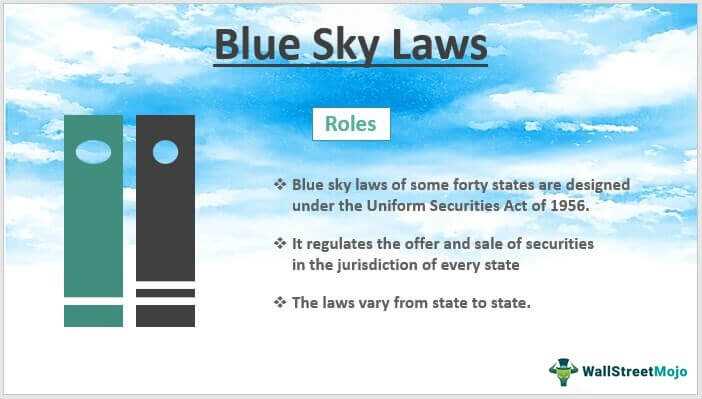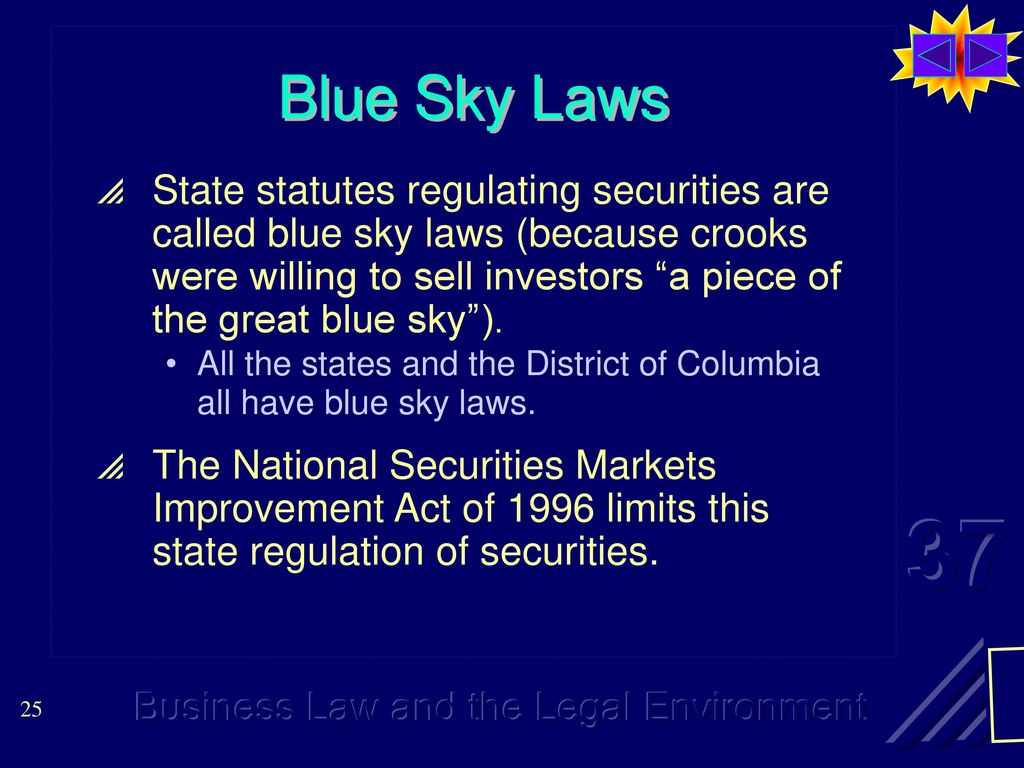What are Blue Sky Laws?

Blue Sky Laws are state regulations that aim to protect investors from fraudulent activities in the securities industry. These laws require companies and individuals selling securities to register with the state securities regulatory agency and provide detailed information about the investment opportunity.
The term “Blue Sky Laws” originated from a comment made by a judge in a court case in the early 20th century. The judge stated that a certain investment opportunity had no more substance than a “blue sky,” which led to the adoption of the term to describe state securities laws.
Blue Sky Laws vary from state to state, but they generally require companies to disclose information such as financial statements, business plans, and the background of the individuals involved in the offering. This information helps investors make informed decisions and protects them from fraudulent schemes.
These laws also regulate the registration and licensing of brokers, dealers, and investment advisers, ensuring that they meet certain qualifications and standards of conduct. By enforcing these regulations, Blue Sky Laws help maintain the integrity of the securities market and promote fair and transparent practices.
Violations of Blue Sky Laws can result in civil and criminal penalties, including fines, imprisonment, and the suspension or revocation of securities licenses. Therefore, it is essential for companies and individuals involved in the sale of securities to comply with these laws to avoid legal consequences.
The Purpose of Blue Sky Laws

Blue Sky Laws are state regulations that aim to protect investors from fraudulent activities in the securities market. These laws require companies and individuals offering securities for sale to register with the state securities regulator and provide detailed information about the investment opportunity.
The primary purpose of Blue Sky Laws is to ensure that investors have access to accurate and reliable information about the securities being offered. By requiring registration and disclosure, these laws help investors make informed decisions and avoid scams or fraudulent schemes.
Another important purpose of Blue Sky Laws is to prevent the sale of securities that are considered too risky or unsuitable for the average investor. The laws require companies to provide financial statements, business plans, and other relevant information to help regulators assess the viability and legitimacy of the investment opportunity.
Furthermore, Blue Sky Laws aim to promote fair and ethical practices in the securities industry. By requiring registration and disclosure, these laws create a level playing field for all market participants and prevent unfair competition or manipulation.
Additionally, Blue Sky Laws provide a legal framework for enforcement actions against individuals or companies that violate securities laws. Regulators have the authority to investigate and prosecute fraudulent activities, impose fines, and revoke licenses or registrations.
In summary, the purpose of Blue Sky Laws is to protect investors, promote transparency and fairness in the securities market, and provide a legal framework for enforcement actions against fraudulent activities. These laws play a crucial role in maintaining the integrity and stability of the financial system.
Regulation of Blue Sky Laws

Blue Sky Laws are regulated at the state level in the United States. Each state has its own set of laws and regulations that govern the sale of securities within its jurisdiction. These laws are designed to protect investors from fraudulent or deceptive practices in the securities market.
The Securities and Exchange Commission (SEC) also plays a role in the regulation of Blue Sky Laws. While the SEC primarily regulates the sale of securities at the federal level, it works in conjunction with state securities regulators to ensure compliance with both federal and state laws.
One of the key components of Blue Sky Laws regulation is the registration process. Before a security can be offered for sale to the public, it must be registered with the state securities regulator. This registration process involves providing detailed information about the security, the issuer, and any associated risks. The state securities regulator reviews this information to ensure that it is accurate and complete, and that the security is suitable for public investment.
In addition to registration, Blue Sky Laws also require ongoing reporting and disclosure by issuers of securities. This includes regular financial reporting, disclosure of material events or changes that may affect the value of the security, and updates on any legal or regulatory actions involving the issuer.
Enforcement of Blue Sky Laws is a shared responsibility between state securities regulators and the SEC. Both entities have the authority to investigate and take enforcement actions against individuals or companies that violate the law. These actions can include fines, penalties, injunctions, and even criminal charges in some cases.
Overall, the regulation of Blue Sky Laws is essential for maintaining the integrity of the securities market and protecting investors from fraud and misconduct. By ensuring that securities offerings are properly registered and that issuers provide accurate and timely information to investors, these laws help to promote transparency and trust in the financial system.

Emily Bibb simplifies finance through bestselling books and articles, bridging complex concepts for everyday understanding. Engaging audiences via social media, she shares insights for financial success. Active in seminars and philanthropy, Bibb aims to create a more financially informed society, driven by her passion for empowering others.
